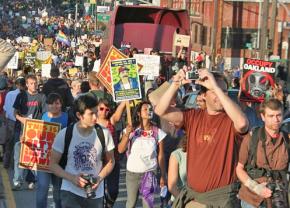We need to get back in step
Bay Area activist comments on the Occupy movement after January 28.
THE OCCUPY movement is debating the lessons of the January 28 attempt by Occupy Oakland to take over an abandoned building. A few key questions and themes have emerged.
First, the assertion by some that Occupy Oakland is now growing, alive again, back in the news and stronger than ever has to be set aside as either wishful thinking or a coping mechanism.
Occupy Oakland is not growing as a result of January 28--in fact, there are profound questions among activists about what Occupy Oakland is and where it is going. Public opinion polls, while not always the decisive measure, have shifted markedly away from support for Occupy Oakland.
Others have claimed that January 28 helped Occupy Oakland by radicalizing the active core; the hundreds of people who faced police repression and got arrested are now more committed than ever, and the movement is now more militant as a result.
There's no question that experiencing police brutality can bring someone closer to revolutionary politics; but that's not the only way people react. And one has to keep in mind that sugary water can be made sweeter by boiling off some of the liquid; we shouldn't celebrate a similar process happening to the Occupy movement.

THE STRENGTH of the Occupy Wall Street movement is not primarily in how militant the core is or how courageous it is in confronting police. The primary strength of the Occupy movement is in its connection to and rooted-ness in a mass base.
Beyond the few thousand people who would show up regularly to Occupy actions, there were at least a few tens of thousands who identified deeply with us and supported us, even if they weren't out on the streets. That latent support was and is crucial to the vitality and future of the movement, even thought it's not always visible. In fact, this dynamic was a major part of Occupy's ability to resist and grow from previous police assaults.
Of course, the politics and boldness of the active core and participants in the movement plays an important role in its development. But in the case of January 28, if it is conceded that perhaps some of the demonstrators became more radical and committed, that was more than overshadowed by the opening of a rift with the mass support for the movement.
Many activists in Occupy see this. But some believe that the rift is entirely the product of a media smear campaign that exaggerated the vandalism in City Hall and used it to vilify the mostly peaceful marches that occurred earlier. The demonization by the corporate media and Oakland politicians is not the whole answer.
The people of Oakland and the Bay Area are not empty vessels, ready to accept at face value whatever nonsense they see on the news. If that were the case, our movement would've withered under the ludicrous public health and safety allegations that the local politicians made late last year.
The truth is that many of our supporters saw the action on TV and YouTube, and saw that some on the march clearly expected or anticipated skirmishes with the police--and some of our supporters decided that we were way out of step with what they wanted to be doing.
This is not to say that the tactics of the movement should be decided based solely upon what most of its supporters are comfortable with. But in this instance, the tactics of January 28 were too out of step with the base. People saw our actions, and they said, "I'm not sure I see myself in that"--whereas before, they may have said, "I'm with them 100 percent, and maybe I should be out there."
The rift is not permanent. The everyday crisis facing people in Oakland and beyond continues to bear down, and the political establishment offers nothing but more austerity and more police violence.
What the elite fear is that the Occupy movement will continue to sink broader and deeper roots, and that some of the millions of people who cheered us on will decide that they too must organize and demonstrate and occupy. A self-critical evaluation of the mistakes of January 28 is an indispensable part of that process.


